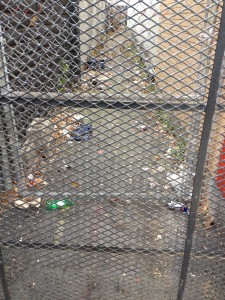By: Nichole Ekkert-Vine
City programs are forced to pick up speed due to the number of improperly discarded syringes quadrupling over the last four years in downtown Ottawa.
According to City of Ottawa open data, the number of reports filed for found syringes in the Rideau-Vanier ward have been rising steadily over the years. A number which may have seemed small just four years ago has now grown to four times the size.
What Ottawa residents may not know however is that this is only a fraction of total needles improperly discarded in Rideau-Vanier each year. Ottawa Public Health reports that over 6000 improperly disposed of needles were collected in the year 2013 by various safety programs downtown.
In response to the rise of dangerous sharps found in the area, Dan Osterer, an employee at the environment and health protection branch of Ottawa Public Health, says that many of their programs have undergone some changes.
“The programs that we do have have grown in size over the past few years due to positive results and increased demand. Our Needle Hunters program has seen an increase in staff as well as an increase in the number of routes that we take to find the sharps,” says Osterer.
“Last year we also implemented the winter route which targets areas where needles may be covered up in the winter months. They will comb the covered areas such as the snow and parking garages.”
The winter route simply targets areas that are trending in needle findings, but that may be covered due to heavy snow. It also targets common areas of public shelter, including the example of parking garages.
This route is a recent addition due to the increase of needles found over the past three years. The Needle Hunters program consists of employees who are trained in safe disposal. They walk their routes a few times a day to make sure that any improperly discarded sharps in the public are taken care of.
A visual (above) a four-year trend. This represents the number of 311 calls due to discovery of improperly disposed of needles, from 2010-2013.
To help understand why some drug users discard their needles improperly, Ottawa Public Health takes note of the items they give out and how many are returned. Cynthia Horvath, an Ottawa Public Health nurse, explains that anyone can drop into OPH and request as many needles and supplemental supplies as they would like, without limit.
Each time someone comes in to fill an order, Horvath says the nurse on duty takes information from the client that does not identify them, but that allows OPH to track their use. Information such as birth year, sex, mothers initials and number of years using drugs all help to put an rough ‘identity’ on a user.
This way their confidentiality is respected, but research on who uses the services and returns the items for disposal can still be conducted. Gathering and analyzing this data is one of the ways Horvath says Ottawa Public Health tries to adapt to change in usage and improper disposal.

Working closely with Ottawa Public Health is DUAL, or the Drug Users Advocacy League, just down the street. DUAL supports safe use of drugs and helps clients through the journey of drug use and addiction.
Chairperson Sean LeBlanc says the area in itself may be to blame for the increasing number of syringes found.
“The majority of Ottawa shelters are located downtown, so this area is at higher risk for those sort of things. The police say anyone found with a syringe will not necessarily get arrested for drug use. Whether this is true or not is another story,” says LeBlanc.
“Often people who are staying in shelters live in fear of getting caught for using, so if they think they are in danger they may be more inclined to just ditch the needle on the street to try and get away from it.”

LeBlanc has been running DUAL since 2010 and says that although it is slow, progress is being made from the efforts of their organization, Ottawa Public Health, and the recent political support for supervised injection sites.
“If you want to know why people are using drugs, why they’re reusing supplies, or why they’re not disposing of the needles properly, you have to ask someone who understands,” says LeBlanc.
“We have a saying here and it’s ‘nothing for us without us.’ You can’t provide help for users without the help of those who can relate, and that’s what makes us so good at our jobs.”
LeBlanc had been an intravenous drug user for 14 years prior to quitting three years ago. “I don’t usually tell people about that, but it’s a lot harder than anyone ever knows and people need to know that,” he says.
DUAL has been working with the city for four years now in response to the rising rates of syringes found by the public. Their mission is to help drug users stay safe from the beginning of their journey and throughout their struggle.
In an effort to reduce the amount of improperly discarded syringes, the organization pairs with different city partners like OPH to tackle health issues that can arise from leaving supplies out in the open or reusing contaminated supplies.
These concerns can range from hepatitis C and AIDS transmission to nerve damage and abscesses. Tyler Pantalone is another employee at DUAL. He says he works to promote safe usage and disposal because he knows first hand what can happen.

“In these past four months I’ve been pretty bad, I’ve been using almost every day,” says Pantalone, showing the small needle wounds on his forearm.
“This is what a clean poke looks like, but for people who are using old needles or are reusing, the health risks are enormous.”
He agrees with LeBlanc that the downtown area has a population much different than other wards in the city, potentially contributing to the large amount of syringes found by the public. He says there’s no place quite like ward 12.
“A lot of the drug-using population are people who don’t have a permanent home or somewhere to keep their supplies,” says Pantalone.
“Normally if you were using at home, you would simply keep your supplies at home. But if you don’t have a home or are in a shelter, it makes it easier to just leave things behind or discard of them somewhere else.”
One thing that LeBlanc says the downtown area is doing to help reduce the number of needles left behind in shelters is the Black Box program. The program is one of the more recent efforts from the city to not only reduce the stigma around drug use but to lower the risk of carelessly discarded syringes in the area.
Shelters participating in the Black Box program allot one box to each person staying over night. The black box is a space where clients can store things such as drugs and supplemental products without getting in trouble with the law. The shelter does not do anything with the items in the box, so long as they are not weapons, and returns the items to the client the next day without question.
“It’s a great way to create a safer and more contained environment in shelters. At least while they are there, there is less drug use happening. Drug users are always scared of what is going to happen if they get caught, and I don’t blame them,” says LeBlanc.
“At least this way the city is keeping people safe and allowing them time to figure things out. It’s been a really hard journey [for DUAL] and everyone involved in the fight, but we’ve come a long way, and change is happening.”
